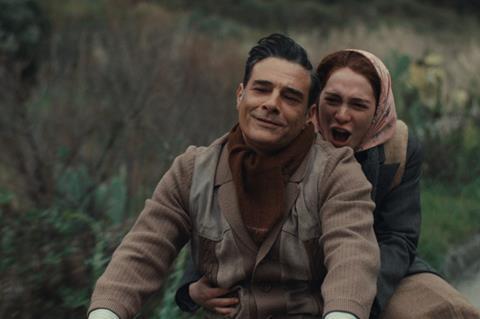Post-war patriarchal Italy is the setting for another take on an independent woman trying to make her own way

Dirs/scr: Daniela Porto, Cristiano Bortone. It/Ger. 2024. 110mins
In 1946, women were allowed to vote in Italian elections for the first time. As Daniela Porto and Cristiano Bortone’s solid period drama eloquently demonstrates, this legislative innovation did not correspond to a shift of attitudes in what was still an overwhelmingly patriarchal society – especially in the south of the country. Featuring strong performances by leads Ludovica Martino and Marco Leonardi, My Place is Here charts the struggles of Marta (Martino), a smart young single mother in a small Calabrian town in the years straddling the end of World War II.
Has its heart in the right place, and knows how to engage ours too
Marta is attempting to cast off the burden of shame that surrounds her unmarried status, and escape her fate of being married off to an abusive older man. The twist – which carries echoes of Ettore Scola’s magisterial 1977 Loren/Mastroianni pairing A Special Day – is that Marta’s sole confidant is the only more-or-less openly gay man in this fiercely conservative rural community.
Based on co-writer/director Daniela Porto’s novel of the same name, and releasing domestically via Adler Entertainment on May 9, the film has something of a young adult drama feel and is, in many ways, a conventionally scripted affair. Yet it sticks admirably to its core business, which is to make us sympathise with its brave but vulnerable protagonist as she comes up against seemingly immovable obstacles.
Italian audiences will inevitably draw parallels with There’s Still Tomorrow, actress Paola Cortellesi’s directing debut, which ripped up the Italian box office last year, surpassing even Barbie. Both are set in the period leading up to that 1946 extension of the suffrage, both are stories of independent women who battle sexist abuse of all kinds to finally achieve some kind of redemption. Already in post-production when Cortellesi’s film was released, this smaller, quieter film will not suffer from the comparison, and may well tap into an appetite – particularly in a country that only recently got its first female prime minister – for stirring feminist narratives. Elsewhere, My Place is Here seems more likely to nuzzle into a streaming slot, furnished as it is with the handsome, tactile production design, costumes and desaturated colour palette of any number of prestige TV period series.
One of the story’s strongest suits is the fact that it places young Marta credibly in her place and time – thus making her slow-brewed rebellion both affecting and believable. When her army-drafted sweetheart tells her “You are my woman” in a 1940-set prologue that explains how she came to be a single mother, she doesn’t object. Neither, three years later, does she put up much of a fight against her hard-up parents’ plan to marry her off to a widowed farmer – after all, we can see her reasoning, he could be a nice guy, might even allow her to get a job.
When she goes to ask her arranged fiancé how he plans to treat her, however, she finds him slaughtering a pig; soon after, he almost slaughters her. Her meeting with Leonardi’s Lorenzo, a gay intellectual with a creative bent who has been taken on by the local priest as a kind of wedding planner, is one of several examples of over-hasty dramatic plotting. But this is all of a piece with a film that doesn’t shy away from bracingly on-the-nose lines of dialogue like Marta’s father’s “You acted like a whore and dragged us into the mud!”. Yet, despite these flaws, My Place is Here has its heart in the right place, and knows how to engage ours too.
In the background is the political ferment of a country that had rid itself of Mussolini, but not of the arrogance of power he represented. One of the film’s more perceptive points is that even the Italian Left was no egalitarian bed of roses: in the local PCI (Italian Communist) party headquarters, Marta finds both an inspiring teacher who promotes typewriting as an avenue to female independence and a male comrade who spouts proletarian clichés then attempts to rape her, convinced that a single mother must be an easy target.
Leonardi, who has come a long way since he played the adolescent Salvatore Di Vita in Cinema Paradiso, is excellent as a proud man whose difference infuriates the locals – a few of whom are in the closet themselves – and makes him even more determined to stick around. But it’s Martino who is the revelation, taking Marta on a journey from resignation to self-determination that is expressed largely in her deep, dark eyes and the set of her mouth.
Production companies: Orisa Produzioni, Goldkind Filmproduktion
International sales: Beta Cinema, beta@betacinema.com
Producers: Cristiano Bortone, Marcus Roth, Sven Burgemeister
Cinematography: Emilio M. Costa
Production design: Alessandra Mura
Editing: Claudio Di Mauro
Music: Santi Pulvirenti
Main cast: Ludovica Martino, Marco Leonardi, Annamaria De Luca, Bianca Maria D’Amato, Giorgia Arena, Francesco Arico, Adele Bilotta, Saverio Malara, Francesco Biscione







![The Brightest SunScreen[Courtesy HKIFF]](https://d1nslcd7m2225b.cloudfront.net/Pictures/274x183/3/5/0/1448350_thebrightestsunscreencourtesyhkiff_312678.jpg)












![The Brightest SunScreen[Courtesy HKIFF]](https://d1nslcd7m2225b.cloudfront.net/Pictures/100x67/3/5/0/1448350_thebrightestsunscreencourtesyhkiff_312678.jpg)



